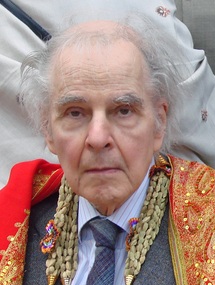Avashyaka II, Caturvimshatistava
The second Avashyaka is a hymn (stava) to the twenty-four (caturvimshati) Tirthankaras and therefore called "Caturvimshatistava". The Tirthankaras ("they who created the tirtha or path toward release from worldly existence") or Jinas ("the victors") are the founders of the Jaina religion. Except for the last two, however, they are not historical figures but those of a legendary antiquity. The last or twenty-fourth Tirthankara is known under the name or rather title of "Mahavira" ("Great Hero"); he was a contemporary of the Buddha (both men were teaching between 450 and 350 AD and both lived in Bihar in Northern India). Mahavira's spiritual predecessor, Parshva, lived some time earlier. The follower of the "Jinas" is called "Jaina" (hence "Jainism"). The main portion of our text (verses 2-4) contains the names of the Tirthankaras (Prakrit form to the left and Sanskrit form to the right).
Avashyaka II demonstrates the tendency toward deification of the Tirthankaras. This was to be expected in the Indian context. Already in the first centuries of our era, Tirthankara images were commissioned on a fairly large scale. Thus there was puja(image worship) -- and there was also a certain amount of bhakti(devotion), not absolutely dissimilar to bhakti as it developed in Hinduism (verses 5-7 below). However natural developments of this type may be, the official doctrine left little scope for such deviations. According to the church authorities, a Tirthankara was never more than a spiritual guide, and even this was limited to his mundane existence.
| Text | Verse 1 | Translation | | logassa ujjoyagare | | I shall praise them - | | dhamma-titthamkare jine / | | they who have illumined the world, the dharma - tirthankaras | | arahante kittaissami cauvvisam pi kevali // | | (the Tirthankaras proclaiming the dharma or the true religion), the jinas, the arhats (the venerable ones), the twenty-four kevalins (enlightened ones). | | | Verse 2 | | | Usabham | 1. | Rishabha | | Ajiyam ca vande | 2. | Ajita | | Sambhavam | 3. | Sambhava | | Abhinandanam ca | 4. | Abhinandana | | Sumaim ca / | 5. | Sumati | | Paumappaham | 6. | Padmaprabha | | Supasam | 7. | Suparshva | | jinam ca Candappaham | 8. | Candraprabha | | vande // | | | | | | Verse 3 | | | Suvihim ca Pupphadantam | 9. | Suvidhi Pushpadanta | | Siyala | 10. | Shitala | | Sejjamsa | 11. | Shreyamsa | | Vasupujjam ca / | 12. | Vasupujya | | Vimalam | 13. | Vimala | | Anantam ca | 14. | Ananta | | jinam Dhammam | 15. | Dharma | | Santim ca | 16. | Shanti | | vandami // | | | | | Verse 4 | | | Kunthum | 17. | Kunthu | | Aram ca | 18. | Ara | | Mallim vande | 19. | Malli | | Munisuvvayam | 20. | Munisuvrata | | Nami-jinam ca / | 21. | Nami | | vandami (A)ritthanemim | 22. | Arishtanemi | | Pasam | 23. | Parshva | | taha Vaddhamanam ca // | 24. | Vardhamana (= Mahavira) | | | Verse 5 | | | evam mae abhithuya vihuya-raya-mala
pahina-jara-marana / | | They whom I have thus extolled, who have shaken off impurities and defilements, who have relinquished old age and death | | cauvisam pi jina-vara titthayara me pasiyantu // | | may they, the twenty-four jinas, the Tirthankaras be gracious to me. | | | Verse 6 | | | kittiya-vandiya-mahiya je 'e logassa uttama siddha / | | They who are praised, worshipped, honoured, they who reside at the summit of the universe, the siddhas (perfect, beatified souls), | | arogga-bohi-labham samahi-varam uttamam dentu // | | may they give me health
and-enlightenment and supreme meditation. | | | Verse 7 | | | candesu nimmalayara aiccesu ahiyam payasagara / | | May the siddhas, purer than the moons, more radiant than the suns, and profound as the oceans, | | sagara-vara-gambhira siddha siddhim mama disantu // | | may they show me the road to siddhi (perfection). | |
 Prof. Dr. Klaus Bruhn
Prof. Dr. Klaus Bruhn